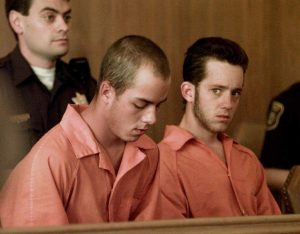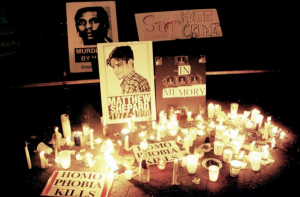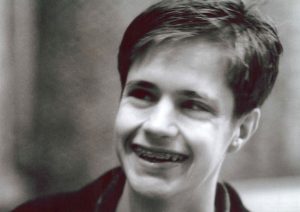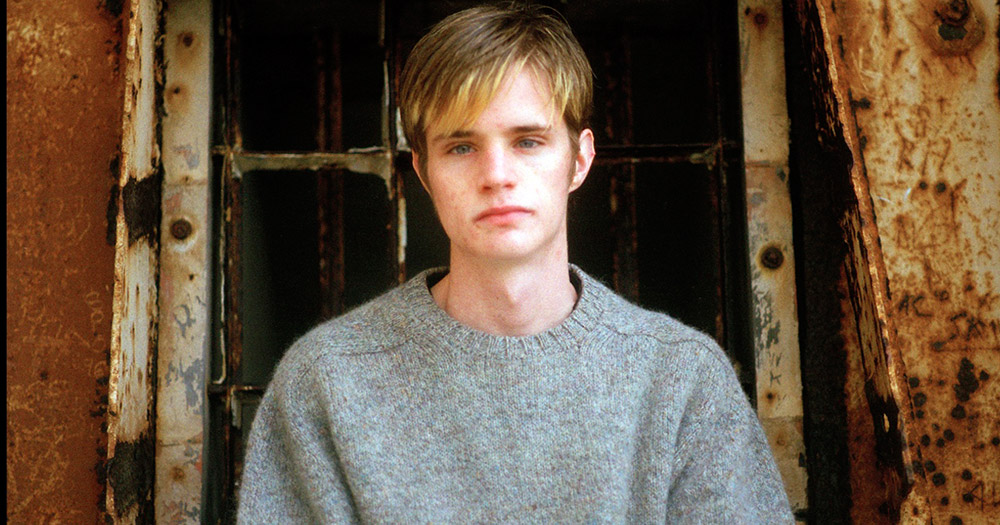“I want people to remember that he was a person, that he was more than this icon in the photograph and the stories,” Judy Shepard said. “He was just, he was a 21-year-old college student who drank too much, who smoked too much and didn’t go to class enough. Just like every other 21-year-old college student. He had flaws. He was smart, funny. People just were drawn to him. And there was a great loss not just to us, but to all his friends. And people who hadn’t met him yet.” Judy Shepard
Two decades ago, Matthew Shepard was brutally attacked by two men who pretended to be gay to win Matt’s confidence, who was sitting alone in a bar.
Aaron McKinney and Russell Henderson offered Matthew a ride home with the intention to rob him, but the attack went further than that and Matt was hit over 20 times in the head and face, by fist and also by a . 357 magnum pistol that Aaron McKinney was carrying.
“McKinney and Henderson took Shepard to a prairie east of town, where they tied him to a fence”, Marsden said.

Matthew was found the next day, 18 hours after the attack, by a passing cyclist.
“He was taken to a Laramie hospital but his injuries were so severe that he needed a neurosurgeon, so he was moved to a Colorado hospital,” Marsden said.
Matt’s parents at the time were in Saudi Arabia, where his father worked. They flew back and were with their son at the hospital for his final days.
When his mother, Judy Shepard, saw the badly beaten college student in the hospital, “he was all bandaged, face swollen, stitches everywhere,” she told ABC News’ ‘Nightline‘.
“His fingers curled, toes curled, one eye was a little bit open.”
Matthew Shepard died on October 12.
The loss “never heals,” his father, Dennis Shepard, told ‘Nightline’. “He was just an ordinary kid who wanted to make the world a better place. And they took that away from him. And from us.”
He grew up and became very interested in international human rights, particularly women’s rights in the Middle East and Asia, and he studied political science.
“His goal was to work for the State Department to try to bring the same privileges and rights he thought he had in America to other countries,” Dennis Shepard said.
A few years before his death, Matthew Shepard came out to his mother on the phone.
“He said, ‘Mom I’m gay.’ And I said, ‘What took you so long to tell me?'” she recalled. “Rejection was not ever an issue in our family.”
Their son was then living an openly out life. “Everybody he met, he said, ‘Just to let you know ahead of time, I’m gay,'” Dennis Shepard said.
“It was like, ‘This is who I am, and that’s the way it’s going to be,'” added Judy Shepard.
Dennis Shepard wasn’t worried about his son’s safety.
“We didn’t realize the amount of violence and discrimination… against the gay community until after he died,” he said. “We thought, he was born here … he has all the rights, responsibilities, duties and privileges of every other American citizen.”
The shocking homophobic hate crime went viral, even before the viral term existed. The nation sympathy moved hundreds of people to protest against hate crimes and homophobia.
“It spawned candlelight vigils all over the country. There was a mass protest on Fifth Avenue in New York in which almost 100 people were arrested,” Marsden said, as well as a vigil at the U.S. Capitol with celebrities and members of Congress.

“All of these spontaneous vigils were organized by volunteers independently of one another. All of the calls to action for hate crime legislation were the work of individual civic and political leaders,” Marsden explained. “It was a spontaneous outrage about the severity of this crime and the overall phenomenon of hate crimes against LGBT people, which were starting to get more social attention around this time than they had received in previous years.”
To the murdered student’s mother, Matthew Shepard shouldn’t just be remembered for his legacy — he should be remembered for his life.

© 2018 GCN (Gay Community News). All rights reserved.
Support GCN
GCN is a free, vital resource for Ireland’s LGBTQ+ community since 1988.
GCN is a trading name of National LGBT Federation CLG, a registered charity - Charity Number: 20034580.
GCN relies on the generous support of the community and allies to sustain the crucial work that we do. Producing GCN is costly, and, in an industry which has been hugely impacted by rising costs, we need your support to help sustain and grow this vital resource.
Supporting GCN for as little as €1.99 per month will help us continue our work as Ireland’s free, independent LGBTQ+ media.
